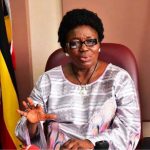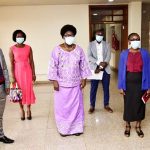The International Organization for Migration (IOM) has concluded a series of stakeholder and cross-border meetings aimed at boosting the cross-border response to COVID-19 among Local Governments from Uganda and neighboring countries. Specifically, the meetings aimed at strengthening the capacity of the COVID-19 response teams in border areas, and boosting cross-border surveillance of the pandemic.
Funded by the British Government’s Department for International Development (DFID), the meetings were organized under a joint project implemented by the World Health Organization and IOM in Uganda in partnership with the Ministry of Health.
The meetings attracted at least 147 health, security, immigration, civil society and local government officials from Uganda and Kenya (meeting held in Tororo for the Busia and Malaba border posts); South Sudan (at Elegu); Democratic Republic of the Congo (at Mpondwe); and the United Republic of Tanzania (at Mutukula). Ugandan COVID-19 stakeholders in the respective border districts first met to review activities in-country, before meeting with colleagues from across the respective borders a week later.
Included in the programme were rigorous reviews of ongoing cross-border COVID-19 response activities such as data collection, testing, screening, isolation, referrals and reporting and highlighting critical gaps.
Among the challenges highlighted by the participants were the lack of harmonized policies and procedures relating to COVID-19 in neighbouring countries, which makes cross-border cooperation difficult. For instance, while Uganda charges truckers for COVID-19 testing, Kenya does not charge, while Tanzania does not emphasize testing or wearing of masks. Participants at Mpondwe also urged greater harmonization of policy among neighbouring states. In all the border meetings, East African governments were urged to agree how to deal with COVID-19, with participants noting that despite the disease, life, commerce and travel continue across both the formal and ungazetted border crossing points.
At Mutukula, at the border with Tanzania, and during the Busia/Malaba meeting, participants highlighted the challenge of a lack of a designated/isolation area where people can wait for their results. Instead, the travellers are left to find their own accommodation. This, argued a Ugandan participant from the eastern district of Tororo, means that potentially infectious travellers awaiting their results freely mix with the border communities.
Another recurring challenge was the shortage of vehicles and/or fuel for transporting samples, contact-tracing, or evacuating positive cases to hospitals or to their residences for home-based care.
“You call the hospital for an ambulance to evacuate positive cases to hospital and someone tells you, ‘The driver in coming,” said a participant from Busia. “You call the next morning and he says ‘Oh, now the ambulance is coming.’ You find that the ambulance is coming for 72 hours. Meanwhile, you are trying to keep the COVID-positive people in that little space.”
Other challenges highlighted at the various meetings included an acute shortage of testing kits; the breakdown of testing machines, which means samples have to be transported for long distances and getting test results take up to seven days; stock out of personal protective equipment (leaving health workers vulnerable); the porous borders that many people continue to use; lack of facilitation of security officers patrolling the borders, and high fees for COVID- 19 tests.
Among the recommendations, participants urged the Ugandan Ministry of Health to develop Port Health into fully fledged unit with specialized staff, which would help enhance its performance.
Governments and development partners were also urged to budget for basic allowances for additional security forces including army officers deployed along the porous borders, who may not be receiving allowances unlike other colleagues including screeners and health workers.
Another call was for COVID testing fees to be dropped. Participants in various sites argued that the USD 65 charged by Uganda was too high for most travelers. Aware of the challenge of funding for tests, participants in Mpondwe called for a memorandum of understanding between Uganda and the Democratic Republic of the Congo for joint resource mobilization.
Participants also called for regular cross-border meetings for COVID-19 response teams from neighboring countries to share views, experiences and innovative solutions.
To reduce congestion especially at Malaba and Busia, participants suggested that testing and sample collection should be removed from the border posts. This would require participants to arrive at points of entry with test results – just like what is expected at airports.








